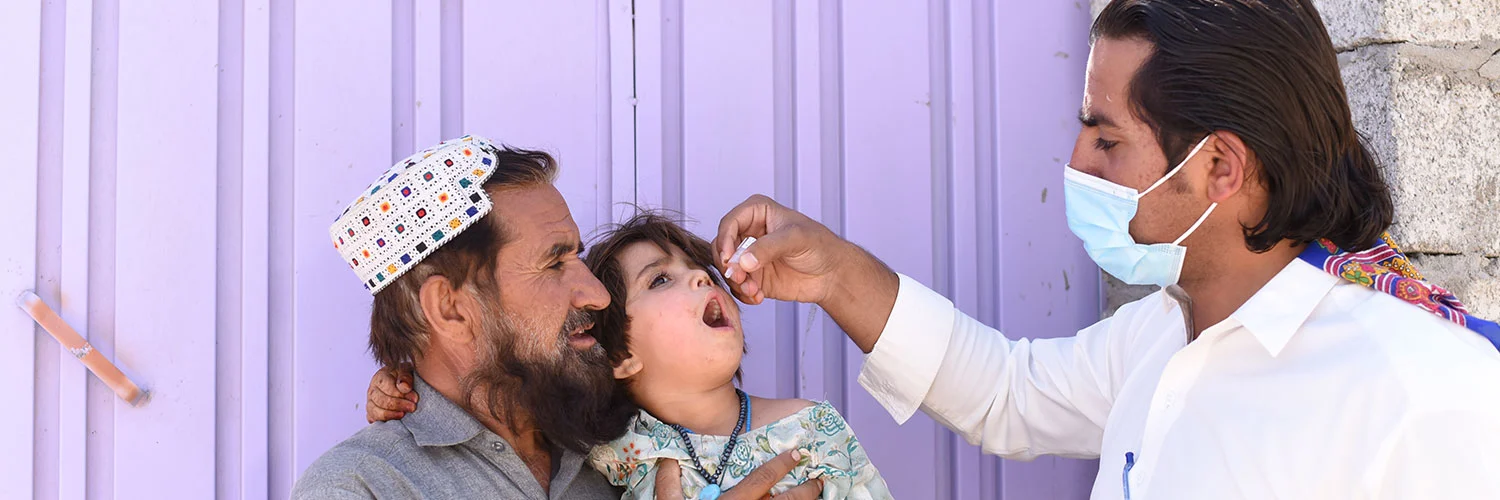Pakistan Polio Programme launches next phase of female polio worker initiative
KARACHI, 29 August 2023 – Women healthcare workers from the Pakistan Polio Programme met Melinda French Gates, co-chair of the Bill & Melinda Gates Foundation, in a virtual roundtable to share updates and launch the next phase of the ‘Female Frontline Worker Co-Design Initiative’.
Participants shared their experiences from this initiative, which aims to systematically listen to and learn from female frontline workers to help solve final barriers to ending polio in Pakistan. They also shared their ideas and aspirations for the future, after Pakistan has successfully achieved this national goal.
“My self-confidence has grown from participating in this initiative, because it is so meaningful that the Polio Programme has taken the time to listen to our experiences and ideas, and that some of the solutions we proposed are being adopted to improve campaigns as well as our work experience,” said one frontline worker. “I’m so motivated to hear that we’ll be supported by the programme in building up other skillsets so we can be ready for other opportunities after polio is gone.”
Pakistan’s National Emergency Operations Centre for Polio Eradication (NEOC) has approved select co-designed solutions from this process and will incorporate them into upcoming immunization campaigns, community engagement efforts, and other day-to-day operations this year. Examples of approved recommendations include a revitalized training package on key topics requested by frontline workers, improved campaign tools and materials, and communications strategies that highlight the value of female polio workers.
In addition to implementing co-designed solutions to accelerate programmatic progress, the Pakistan Polio Programme will begin the next phase of this initiative by “upskilling” female polio workers in other capacities and helping them prepare for potential future opportunities after polio eradication.
The Minister of National Health Services Regulation & Coordination, Dr Nadeem Jan, also expressed the Government of Pakistan’s commitment to supporting female polio health workers, including in exploring future livelihood pathways for a post-polio world.
“Polio health workers have served Pakistan with incomparable dedication. Whether braving extreme weather conditions or navigating volatile security situations, they have remained steadfast in their commitment,” Dr Jan said, adding that, “It is our duty to not only appreciate their invaluable services but also ensure that this excellent workforce continues to contribute to the country after polio ends. This is why the new phase of the Female Frontline Workers Initiative is very important for us to build their capacities in different areas and ensure they have good job opportunities in the future.”
Ms. French Gates praised the initiative’s progress and the programme’s commitment to supporting female workers through the next phase of this work. “These women are the heart of the polio eradication programme and ensuring their expertise and solutions are at the center of eradication efforts is critical,” she said. “This initiative will not only help ensure that every child can receive life-saving vaccines, but it will also give these women important skills and training to support other health efforts, and to pursue economic opportunities in the future.”
Ms. French Gates also reinforced the foundation’s longstanding commitment to ending polio in Pakistan and to working in partnership with the country to improve health and wellbeing nationwide.
The virtual roundtable served as a follow-up to Ms. French Gates’s first meeting with female health workers in Pakistan last year. It was moderated by Anita Zaidi, President of Gender Equality at the Bill & Melinda Gates Foundation, and also included Dr Shumaila Rasool, a member of the programme’s National Gender Working Group and the Sindh Emergency Operations Center core team.
Note for the Editor:
Polio is a highly infectious disease caused by poliovirus mainly affecting children under the age of five years. It invades the nervous system and can cause paralysis or even death. While there is no cure for polio, vaccination is the most effective way to protect children from this crippling disease. Each time a child under the age of five is vaccinated, their protection against the virus is increased. Repeated immunisations have protected millions of children from polio, allowing almost all countries in the world to become polio-free, besides the two endemic countries of Pakistan and Afghanistan.
For further information, please contact:
Mr. Zulfiqar Babakhel, Media Manager, NEOC, 0345-9165937;
Email: This email address is being protected from spambots. You need JavaScript enabled to view it.

